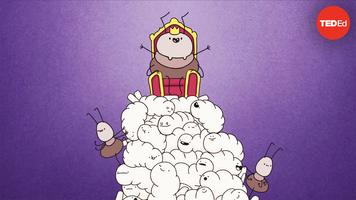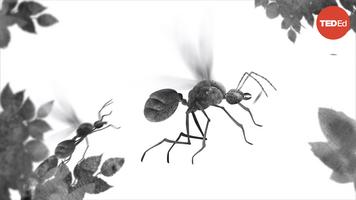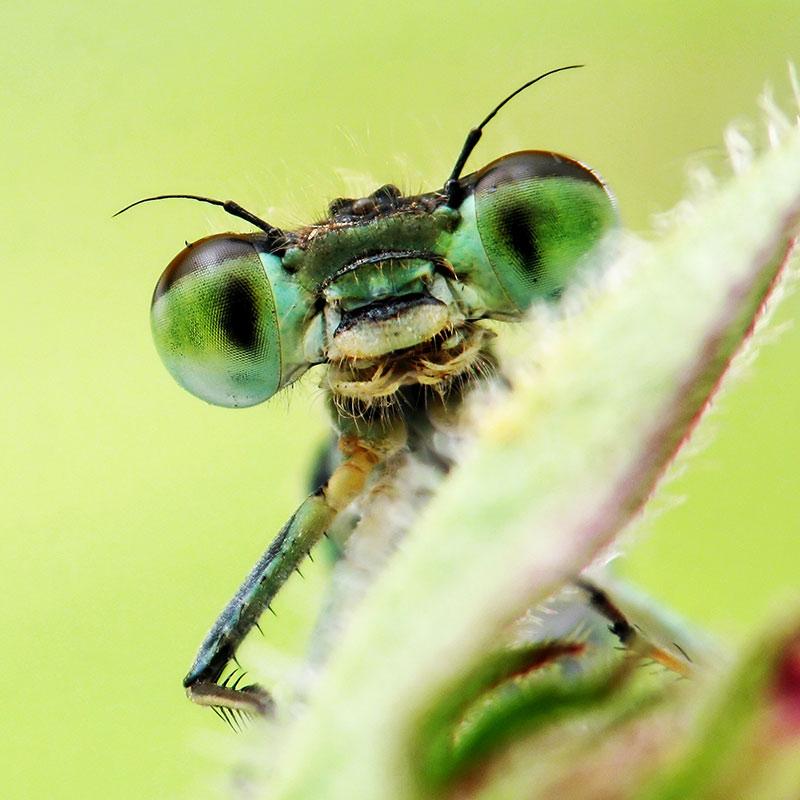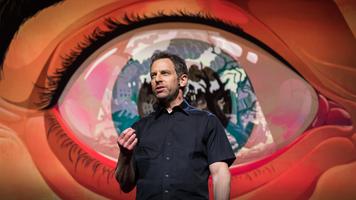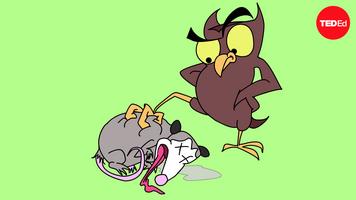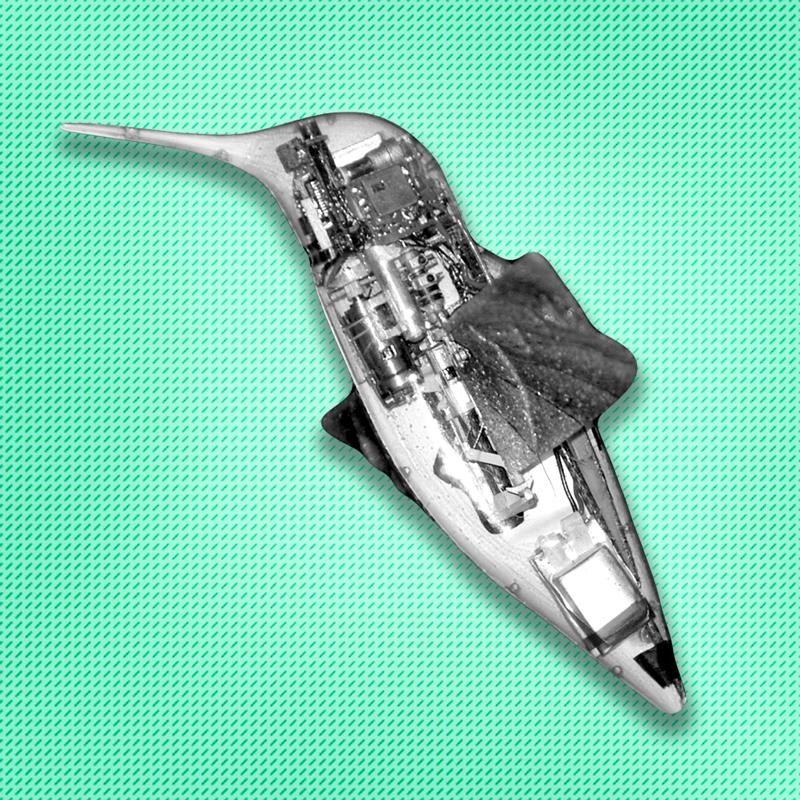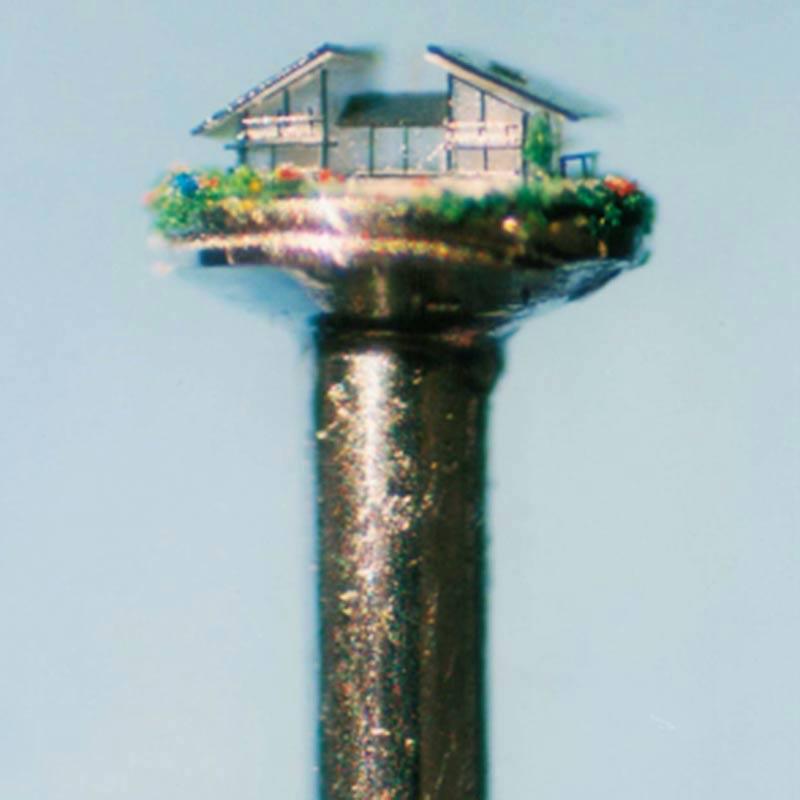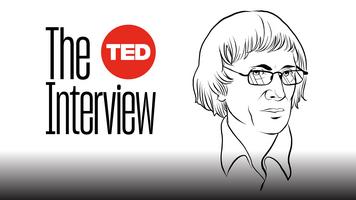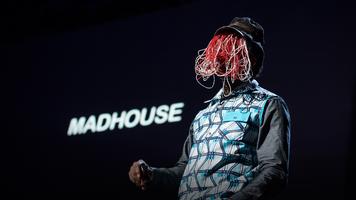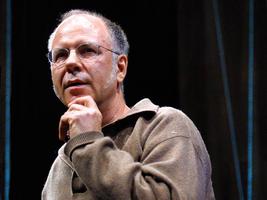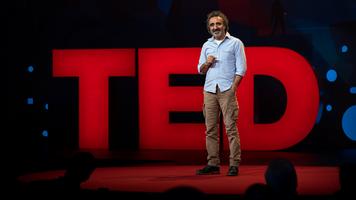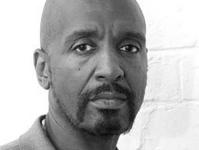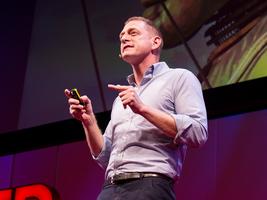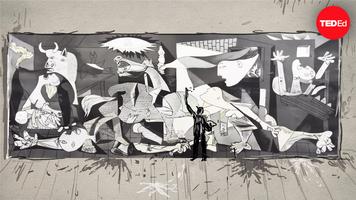All results
1 - 30 of 796 results
Kirsti Abbott: The ants that run the world
Some time ago, the yellow crazy ant was accidentally brought to Australia's Christmas Island. These ants, known for their predatory behavior, can kill organisms over 500 times their size. In this fascinating talk, find out how Dr. Kirsti Abbott and her team are studying these insects and working on ways to re-balance the Christmas Island ecosystem.
Daniel Finkel: Can you solve the killer robo-ants riddle?
The good news is that your experimental robo-ants are a success. The bad news is that you accidentally gave them the ability to shoot deadly lasers ... and you can't turn it off. Can you stop them from escaping their habitat before the lasers are activated? Dan Finkel shows how. [TED-Ed Animation by Artrake Studio].
Deborah Gordon: Inside the ant colony
Ants have one of the most complex social organizations in the animal kingdom; they live in structured colonies that contain different types of members who perform specific roles. Sound familiar? Deborah M. Gordon explains the way these incredible creatures mate, communicate and source food, shedding light on how their actions can mimic and infor...
Charles Wallace: Puke, poop and tiny cockroaches: How the leafcutter ant queen runs her farm
In a Texas clearing, an ancient tale that ties four species together is unfurling. The first involved is a soon-to-be queen leafcutter ant. The second is fungus, a piece of which she scoops into her mouth pocket. The third are cockroaches, which nestle under her wings. And the fourth is the one that threatens them all. Charles Wallace takes a lo...
Deborah Gordon: What ants teach us about the brain, cancer and the Internet
Ecologist Deborah Gordon studies ants wherever she can find them -- in the desert, in the tropics, in her kitchen ... In this fascinating talk, she explains her obsession with insects most of us would happily swat away without a second thought. She argues that ant life provides a useful model for learning about many other topics, including disea...
Deborah Gordon: The emergent genius of ant colonies
Deborah Gordon studies ant colonies in the Arizona desert to understand their complex social system. She asks: How do these chitinous creatures get down to business -- and even multitask when they need to -- with no language, memory or visible leadership? Her answers could lead to a better understanding of all complex systems, from the brain to ...
Playlist: Insects are awesome! (11 talks)
Bugs are one of nature's wonders. These insect-obsessed speakers talk about how ants form societies, how bees pollinate flowers, and how termites can be quite ... tasty.
Curated by TED · 11 talks
Francesca Barbero: Would you raise the baby that ate your siblings?
You might not guess it, but Alcon blue butterflies are just one of over 200 parasitic butterfly species, all of which target ants. And their offspring live highly unusual lives, tricking their way into ant colonies using mimicry. So, how do these butterflies do it— and why? Francesa Barbero explores the strategies caterpillars use to survive amo...
Deborah Gordon | TED Speaker
By studying how ant colonies work without any one leader, Deborah Gordon has identified striking similarities in how ant colonies, brains, cells and computer networks regulate themselves.
Ecologist
Sam Harris: Can we build AI without losing control over it?
Scared of superintelligent AI? You should be, says neuroscientist and philosopher Sam Harris -- and not just in some theoretical way. We're going to build superhuman machines, says Harris, but we haven't yet grappled with the problems associated with creating something that may treat us the way we treat ants.
Sarah Bergbreiter: Why I make robots the size of a grain of rice
By studying the movement and bodies of insects such as ants, Sarah Bergbreiter and her team build incredibly robust, super teeny, mechanical versions of creepy crawlies … and then they add rockets. See their jaw-dropping developments in micro-robotics, and hear about three ways we might use these little helpers in the future.
Tierney Thys: The surprising reasons animals play dead
From lemurs to lizards, ants to amphibians, sharks to chickens, hundreds of animals "play dead" as a survival tactic. But how and why do animals do this? Tierney Thys explains how this curious behavior, known as tonic immobility or TI for short, can be used as a defense or offense. [Directed by John R. Dilworth, narrated by Susan Zimmerman, musi...
Playlist: Technology designed by nature (10 talks)
These exciting innovations and breakthroughs demonstrate what's possible when humans draw inspiration from some of nature’s best work.
Curated by TED · 10 talks
Playlist: The world of tiny things (12 talks)
Zoom in -- way, way in -- to look at the world from speck's-eye view. Learn about very tiny insects, the world at the nanoscale, and sculptures so small it's best to hold your breath while viewing.
Curated by TED · 12 talks
The TED Interview: David Deutsch on the infinite reach of knowledge
It can be easy to believe that humans are insignificant. We're specks of dust on a random planet in a vast universe. Less powerful than elephants. Fewer than ants. But David Deutsch believes that's all beside the point, because humans possess one unique skill: attaining knowledge. David Deutsch -- Oxford professor, father of quantum computing, r...
Anas Aremeyaw Anas: How I named, shamed and jailed
Journalist Anas Aremeyaw Anas has broken dozens of stories of corruption and organized crime all over Ghana -- without ever revealing his identity. In this talk (in which his face remains hidden) Anas shows grisly footage from some of his investigations and demonstrates the importance of facing injustice.
Sheila Patek | TED Speaker
Biologist Sheila Patek is addicted to speed -- animal speed. She's measured the fastest animal movements in the world, made by snail-smashing mantis shrimp and the snapping mandibles of trap-jaw ants.
Biologist, biomechanics researcher
Steven Johnson wants to know how enlightenment happens (Transcript)
The TED Interview
Steven Johnson wants to know how enlightenment happens
June 23, 2022
[00:00:00] Chris Anderson:
Well, hello there. Uh, welcome to The TED Interview. This is Chris Anderson. Now then, uh, this episode may start out sounding a bit like bad news, but it really, it really isn't. By the time it's over, it's going to sound like ver...
Michael Anti: Behind the Great Firewall of China
Michael Anti (aka Jing Zhao) has been blogging from China for 12 years. Despite the control the central government has over the Internet -- "All the servers are in Beijing" -- he says that hundreds of millions of microbloggers are in fact creating the first national public sphere in the country's history, and shifting the balance of power in une...
What we can learn from the Anternet: Deborah Gordon at TED2014
"I study ants in the desert, in the tropical forest and in my kitchen," says Deborah Gordon.
An ecologist, she researches the behavior of ant colonies -- which are systems that operate without central control. (While they have a queen, Gordon explains, the queen only lays eggs and doesn't actually issue orders.) Gordon thinks that, from a...
Posted March 20, 2014
Unorthodox new pets in the TED office
We at TED have a new addition to the office: a space-age ant farm!
The Ant Column Cylinder Ant Farm arrived at our office last week. It’s a six-inch tube filled with a nutrient-rich blue goo. We added ants ordered from Ants Alive into the equation and within a few hours, the ants had built a complicated series of tunnels in the goo and looked...
Posted May 3, 2013
E.O. Wilson | TED Speaker
Biologist E.O. Wilson explored the world of ants and other tiny creatures -- and wrote movingly about the way all creatures, great and small, are interdependent.
Biologist
In Short: Scientific findings as a Rorschach test, the physics of the Olympic athletes
Enjoy these fascinating reads from across the internet:
In this podcast about the spread of Argentine ants -- which hitchhike between continents and fight any ant not a part of their clan -- evolutionary biologist Neil Tsutsui makes the interesting statement that his work is like a Rorschach test. He explains, “We’ve had people say, ‘Loo...
Posted August 7, 2012
There’s no upside down in space
Deborah Gordon studies ants and the way they form networks to get things done. Like nodes on the internet, individual ants organize into large, complex systems by passing simple signals back and forth. We’re encouraged to call this the “Anternet,” and Gordon and her collaborators are thinking in terms of network theory -- studying how ants creat...
Posted May 13, 2014
Tom Shannon: Anti-gravity sculpture
Tom Shannon shows off his gravity-defying, otherworldly sculpture -- made of simple, earthly materials -- that floats and spins like planets on magnets and suspension wire. It's science-inspired art at its most heavenly.
Hamdi Ulukaya: The anti-CEO playbook
Profit, money, shareholders: these are the priorities of most companies today. But at what cost? In an appeal to corporate leaders worldwide, Chobani founder Hamdi Ulukaya calls for an end to the business playbook of the past -- and shares his vision for a new, "anti-CEO playbook" that prioritizes people over profits. "This is the difference bet...
Willard Wigan | TED Speaker
Willard Wigan sculpts figures small enough to fit on the head of a pin. To create these microscopic masterpieces, he works diligently through the stillest hours of the night, between his own heartbeats.
Micro-sculptor
David Binder: The arts festival revolution
David Binder is a major Broadway producer, but last summer he found himself in a small Australian neighborhood, watching locals dance and perform on their lawns -- and loving it. He shows us the new face of arts festivals, which break the boundary between audience and performer and help cities express themselves.
Iseult Gillespie: Why is this painting so shocking?
In 1937, in one of the worst civilian casualties of the Spanish Civil War, Fascist forces bombed the village of Guernica in Northern Spain. For Pablo Picasso, the tragedy sparked a frenzied period of work in which he produced a massive anti-war mural, titled "Guernica." How can we make sense of this overwhelming image, and what makes it a master...
